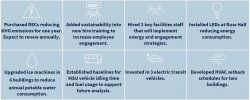Plan Update 2023
Plan Update: December 2023
After the initial implementation period, Facilities re-examined the goals & metrics set forth in 2022. It was determined that some goals should be modified and some metrics dropped. The revised list is below.
Guiding Principle
University Facilities develops and maintains high-quality, resource efficient campus buildings.
Goals
01-1: Increase metering to support total energy and water accountability.
01-2: Reduce potable water consumption.
01-3: Reduce campus-wide energy use intensity.
01-4: Reduce Scope 1 greenhouse gas emissions.
01-5: Develop and implement a comprehensive strategy to neutralize Scope 2 emissions.
01-6: Maximize construction waste diversion.
Metrics/Milestones
- Percentage of facilities over 10,000 GSF that have stand-alone building energy and water meters
- Campus-wide water consumption in gallons
- Campus-wide EUI in kBTU / square foot / year
- Annual Scope 1 GHG emissions to MT CO2e
- Annual Scope 2 GHG emissions in MT CO2e
- Percentage of construction waste, in tons, diverted annually
Guiding Principle
University Facilities preserves planetary and human health by operating high-performance campus buildings.
Goals
02-1: Reduce waste generation.
02-2: Increase waste diversion from landfill.
02-3: Reduce the environmental impact of cleaning products and janitorial paper products.
Metrics/Milestones
- Waste generated annually in tons
- % of waste stream diverted from landfill
- Percentage of cleaning product purchases on certified green cleaning products
- Percentage of janitorial paper product purchases on certified green janitorial paper products
Guiding Principle
University Facilities supports a unified approach to campus sustainability outreach and education.
Goals
03-1: Increase awareness of campus sustainability within University Facilities personnel.
03-2: Build partnerships to increase student, faculty, and staff awareness of campus sustainability.
Metrics/Milestones
- Response rate to annual University Facilities sustainability literacy and culture assessment
- Percentage of sustainability literacy and culture assessment respondents who indicate they incorporate sustainability into their work activities
Guiding Principle
University Facilities supports low-carbon campus mobility.
Goals
04-1: Evolve transportation and parking policies to better support sustainability.
04-2: Reduce Scope 3 emissions generated by commuter reliance on single occupancy vehicles.
04-3: Reduce Scope 1 emissions generated by campus fleet vehicles.
Metrics/Milestones
- Annual Scope 3 GHG emissions attributable to commuting in MT CO2e
- Annual Scope 1 GHG emissions attributable to the campus fleet in MT CO2e
- Annual vehicle miles traveled by the campus fleet
- Annual average idling time for campus fleet vehicles
- Percentage of campus fleet that is alternatively fueled
Guiding Principle
University Facilities develops and maintains high-quality, resource efficient campus landscapes.
Goals
05-1: Increase use of automated systems to reduce irrigation’s demand for potable water.
05-2: Electrify grounds and landscape maintenance equipment.
Metrics/Milestones
- Annual potable water consumption for irrigation in thousand gallons
- Percentage of grounds and landscape equipment that is electric and/or battery-powered
Implementation
Plan Implementation
Following the release of the Facilities Sustainability Plan in 2022, we entered into a 1-year implementation period with Brightworks Sustainability, LLC on board to assist with
- Program management
- Data analysis and baseline establishment
- Training/Developing capabilities
- Facilities Sustainability Implementation Plan/Manual
- Staff Training & Handover
- Sustainability Strategy Support
Between Q4 2022 and Q3 2023, the Assistant Director of Sustainability and Brightworks held quarterly check-in meetings with key members of the University Facilities staff. These meetings were intended to equip the staff with the resources and tools needed to implement the strategies outlined in the Plan and to provide feedback on their efforts. This implementation period saw excellent progress made and included several strategies that reached completion.
Wins & Highlights

Plan Launch
Plan Launch
In April 2022, University Facilities launched its Sustainability Plan. The plan is the result of 18 months of effort, engaging staff throughout the division as well as staff from other areas of the university which work closely with Facilities.
The plan is structured around six areas of impact within the purview of University Facilities. Each chapter of the Facilities Sustainability Plan includes a description of the existing conditions within that area as well as infographics of relevant existing datasets and noteworthy stories of initiatives Facilities has already completed. Each area also includes a guiding principle that will serve as an enduring touchstone as the sustainability goals and actions continue to evolve.
The following sections list the guiding principles and goals for each area. For full details, including the metrics to be measured, action items, the business case, a plan for accountability, the results of a peer benchmarking study, and more, please download the full document.
Guiding Principle
University Facilities develops and maintains high-quality, resource efficient campus buildings.
Goals
01-1: Increase metering to support total energy and water accountability.
01-2: Reduce potable water consumption and annual potable water costs.
01-3: Reduce campus-wide energy use intensity and annual energy costs.
01-4: Reduce Scope 1 greenhouse gas emissions.
01-5: Develop and implement a comprehensive strategy to neutralize Scope 2 emissions.
01-6: Maximize construction waste diversion.
Guiding Principle
University Facilities preserves planetary and human health by operating high-performance campus buildings.
Goals
02-1: Reduce waste generation.
02-2: Increase waste diversion from landfill.
02-3: Reduce the environmental impact of cleaning products and janitorial paper products.
Guiding Principle
University Facilities supports a unified approach to campus sustainability outreach and education.
Goals
03-1: Increase awareness of campus sustainability within University Facilities personnel.
03-2: Build partnerships to increase student, faculty, and staff awareness of campus sustainability.
Guiding Principle
University Facilities supports low-carbon campus mobility.
Goals
04-1: Evolve transportation and parking policies to better support sustainability.
04-2: Reduce Scope 3 emissions generated by commuter reliance on single occupancy vehicles.
04-3: Reduce Scope 1 emissions generated by campus fleet vehicles.
Guiding Principle
University Facilities develops and maintains high-quality, resource efficient campus landscapes.
Goals
05-1: Increase use of automated systems to reduce irrigation’s demand for potable water.
05-2: Electrify grounds and landscape maintenance equipment.
Guiding Principle
University Facilities’ leverages the University’s purchasing power to accelerate the availability of sustainable goods in the marketplace.
Goals
06-1: Reduce the environmental impact of campus building materials.
The University Facilities Sustainability Plan represents our commitment to upgrade and exceed our past practices to ensure the viability of our environment and our institution for future generations. It allows the division to catalog our previous successes and establish a formal and transparent course toward a more sustainable future.
Shawn Connolly, Vice President, University Facilities
